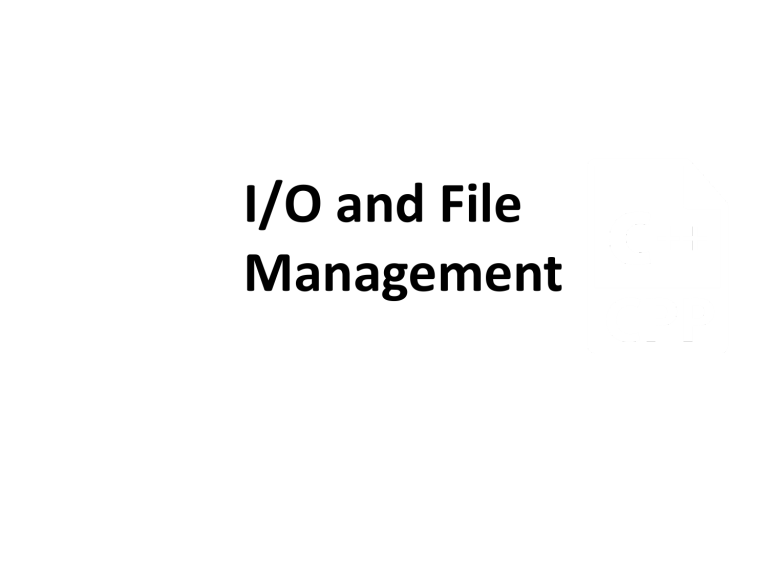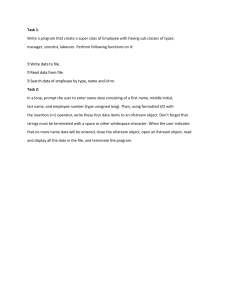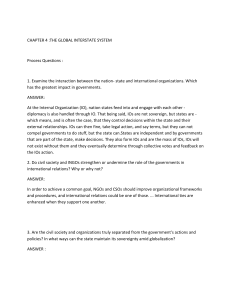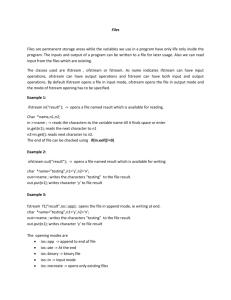
I/O and File
Management
Unformatted and Formatted I/O
put(), get(), getline(), write() - Unformatted I/O Operations
char ch;
cin.get(ch);
ch=cin.get();
cin>>ch;
cout.put(ch);
cout.put('x');
Get a character from keyboard
Similar to cin.get(ch);
The operator >> can also be used to read a
character but it will skip the white spaces
and newline character.
put() function can be used to display value of
variable ch or character.
char name[20];
cin.getline(name,10);
getline() reads whole line of text
line size
that ends with newline character or
upto (size-1).
cin can read strings
that do not contain white
cin>>name;
spaces.
write() displays string of given size, if
cout.write(name,10);
the size is greater than the length of
line, then it displays the bounds of
line.
ios Format Functions
Function
width()
Task
To specify the required field size for displaying an output value
precision() To specify number of digits to be displayed after the decimal point of
a float value.
fill()
To specify a character that is used to fill the unused portion of a field.
setf()
To specify format flags that can control the form of output.
unsetf()
To clear the flags specified
output:
output:
Example:
cout.precision(6);
cout.fill('*');
cout.width(6);
cout.setf(ios::left,ios::adjustfield);
* * * 5 42 3. 6 4 5 7 5
cout.width(10);
cout.width(6);
cout<<"543";
cout.width(6);
output:
cout<<sqrt(7);
cout<<"543";
cout.fill('#');
cout<<"543";
5 4 3 # # #
Flags and bit fields
Format required
Flag (arg1)
Bit-field (arg2)
Left justified output
ios::left
ios::adjustfield
Right justified output
ios::right
ios::adjustfield
Scientific notation
ios::scientific
ios::floatfield
Fixed point notation
ios::fixed
ios::floatfield
Decimal base
ios::dec
ios::basefield
Octal base
ios::oct
ios::basefield
Hexadecimal base
ios::hex
ios::basefield
setf(arg1, arg2)
arg-1: one of the formatting flags.
arg-2: bit field specifies the group to which the formatting flag belongs.
Manipulators for formatted I/O operations
Manipulators are special functions that can be included in the I/O
statements to alter the format parameters of a stream.
To access manipulators, the file <iomanip> should be included in
the program.
Function
width()
Manipulator
setw()
Meaning
Set the field width.
precision() setprecision()
Set the floating point precision.
fill()
setfill()
Set the fill character.
setf()
setiosflags()
Set the format flag.
unsetf()
resetiosflags()
Clear the flag specified.
“\n”
endl
Insert a new line and flush stream.
File stream classes
File input output streams
read data
Input stream
Disk Files
data
input
Program
Output stream
write data
File input output streams
data
output
File stream classes for file operations
ios
iostream
file
istream
streambuf
ostream
iostream
fstream
file
ifstream
fstream
ofstream
filebuf
fstream base
To read content
from the file
To write content
to the file
File stream classes
class
contents
fstreambase
Provides operations common to the file streams.
Contains open() and close() functions.
ifstream
Provides input operations.
Contains open() with default input mode.
Inherits get(), getline(), read(), seekg() and tellg() functions from
istream.
ofstream
Provides output operations.
Contains open() with default output mode.
Inherits put(), seekp(), tellp() and write() functions from
ostream.
fstream
Provides support for simultaneous input and output operations.
Inherits all the functions from istream and ostream from
iostream.
filebuf
Its purpose is to set the file buffers to read and write.
File handling steps
1. Open / Create a file
2. Read / Write a file
3. Close file
Create and Write File (Output)
Create object of ofstream class
ofstream send;
Call open() function using ofstream object to open a file
send.open("abc.txt");
This will open existing file, if not exist
then it will create file.
Write content in file using ofstream object
send<<"Hello, this is India";
Call close() function using ofstream object to close file
send.close();
Open and Read File (Input)
Create object of ifstream class
ifstream rcv;
Call open() function using ifstream object to open a file
rcv.open("abc.txt");
Read content of file using ifstream object
rcv>>name;
rcv.getline(name);
Call close() function using ifstream object to close file
rcv.close();
Opening a file
ofstream outFile("sample.txt"); //output only
ifstream inFile("sample.txt"); //input only
ofstream outFile;
outFile.open("sample.txt");
This creates outFile as an ofstream object that manages the output
stream.
ifstream
inFile;
This object can be any valid C++ name such as myfile, o_file .
inFile.open("sample.txt");
Syntax file open() function:
stream-object.open("filename", mode);
By default ofstream opens file for writing only and ifstream
opens file for reading only.
File open() function
File open() function
Syntax:
stream-object.open("filename", mode);
By default ofstream opens file for writing only
By default ifstream opens file for reading only.
Three ways to create a file
1
ofstream send("abc.txt");
2
ofstream send;
send.open("abc.txt");
3
ofstream send;
send.open("abc.txt",ios::out); //open()
function with mode
//constructor
//open() function
File opening modes
Parameter
Meaning
ios :: in
Open file for reading only
ios :: out
Open file for writing only
ios :: app
Append to end-of-file
ios :: ate
Go to end-of-file on opening
ios :: binary
Binary file
ios :: trunc
Delete content of file if exists
ios :: nocreate
Open fails if the file does not exists
ios :: noreplace
Open fails if the file already exists
File operations
#include <iostream>
#include <fstream>
using namespace std;
int main ()
{
ofstream myfile;
myfile.open("example.txt",ios::out);
myfile << "This is India.\n";
myfile.close();
}
example.txt
.cpp
This is India
File operations (Cont..)
int main ()
{
char line[50];
ifstream rfile;
rfile.open("example.txt",ios::in)
rfile.getline(line,50);
// rfile>>line is also valid;
cout<<line;
rfile.close();
}
example.txt
This is India
.cpp
This is india
int main()
{
char product[20];
int price;
cout<<"Enter product name=";
cin>>product;
cout<<"Enter price=";
cin>>price;
File operations program
ofstream outfile("stock.txt");
outfile<<product<<endl;
outfile<<price;
ifstream infile("stock.txt");
infile>>product;
infile>>price;
cout<<product<<endl;
cout<<price;
}
Opening a file to write
data into file
Opening a file to read
data from file
File handling Program
Write a program that opens two text files for reading data.
It creates a third file that contains the text of first file and then
that of second file
(text of second file to be appended after text of the first file, to
produce the third file).
int main() {
fstream file1,file2,file3;
file1.open("one.txt",ios::in);
file2.open("two.txt",ios::in);
file3.open("three.txt",ios::app);
char ch1,ch2;
while(!file1.eof())
{
file1.get(ch1); cout<<ch1<<endl;
file3.put(ch1);
}
file1.close();
while(!file2.eof())
{
file2.get(ch2); cout<<ch2<<endl;
file3.put(ch2);
}
file2.close(); file3.close();
}
File pointers
Each file has two associated pointers known as the file pointers.
One of them is called input pointer (or get pointer) and the other
is called output pointer (or put pointer).
Input pointer is used for reading the content of a given file
location.
Output pointer is used for writing to a given file location.
Functions for manipulation of file pointers
Function
Meaning
seekg()
Moves get pointer (input) to specified location
seekp()
Moves put pointer (output) to specified location
tellg()
Gives current position of the get pointer
tellp()
Gives current position of the put pointer
ifstream rcv;
ofstream send;
rcv.seekg(30); //move the get pointer to byte number 30 in the file
send.seekp(30);//move the put pointer to byte number 30 in the file
int posn = rcv.tellg();
int posn = send.tellp();
Functions for manipulation of file pointers
Another prototype
seekg ( offset, direction );
seekp ( offset, direction );
Function
Meaning
ios::beg
offset counted from the beginning of the stream
ios::cur
offset counted from the current position of the
stream pointer
ios::end
offset counted from the end of the stream
write() and read() functions
The functions write() and read(), different from the
functions put() and get(), handle the data in binary form.
infile.read ((char * ) &V,sizeof(V));
outfile.write ((char *) &V ,sizeof(V));
These functions take two arguments. The first is the address of the
variable V, and the second is the length of that variable in bytes.
The address of the variable must be cast to type char*(i.e pointer
to character type).
Reading & Writing class objects
class inventory
{
char name[10];
float cost;
public:
void readdata()
{
cout<<"Enter Name=";
cin>>name;
cout<<"Enter cost=";
cin>>cost;
}
void displaydata()
{
cout<<"Name="<<name<<endl;
cout<<"Cost="<<cost;
}
};
Reading & Writing class objects
int main()
{
inventory ob1;
cout<<"Enter details of product\n";
fstream file;
file.open("stock.txt",ios::in | ios::app);
ob1.readdata();
file.write((char *)&ob1,sizeof(ob1));
file.read((char *)&ob1,sizeof(ob1));
ob1.displaydata();
file.close();
}
Thank You


